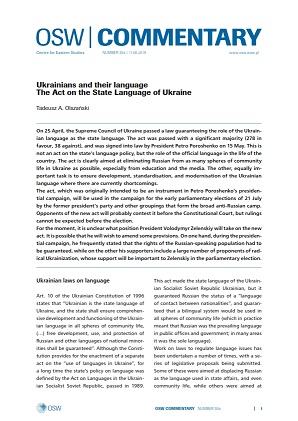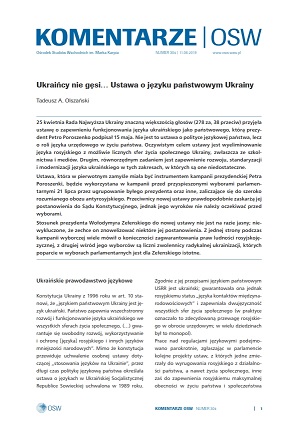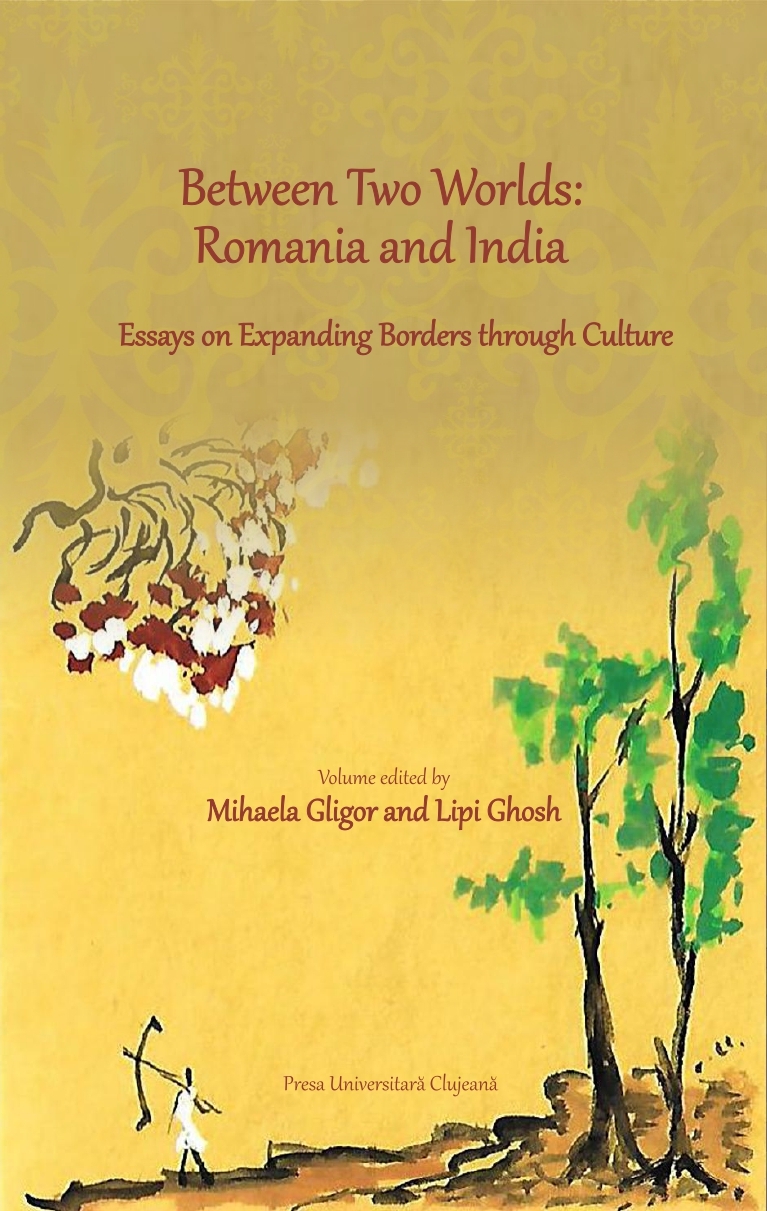
ЕДНА БЪЛГАРСКА АЛЕКСАНДРИЯ ОТЪ 1810 ГОД.
Published in 1936 by the Bulgarian Academy of Sciences (Department for History and Philology) as vol 13 of the series "Bulgarian Old Age" (БЪЛГАРСКИ СТАРИНИ, КНИГА XIII)
More...We kindly inform you that, as long as the subject affiliation of our 300.000+ articles is in progress, you might get unsufficient or no results on your third level or second level search. In this case, please broaden your search criteria.

Published in 1936 by the Bulgarian Academy of Sciences (Department for History and Philology) as vol 13 of the series "Bulgarian Old Age" (БЪЛГАРСКИ СТАРИНИ, КНИГА XIII)
More...
On 25 April, the Supreme Council of Ukraine passed a law guaranteeing the role of the Ukrainian language as the state language. The act was passed with a significant majority (278 in favour, 38 against), and was signed into law by President Petro Poroshenko on 15 May. This is not an act on the state’s language policy, but the role of the official language in the life of the country. The act is clearly aimed at eliminating Russian from as many spheres of community life in Ukraine as possible, especially from education and the media. The other, equally important task is to ensure development, standardisation, and modernisation of the Ukrainian language where there are currently shortcomings. The act, which was originally intended to be an instrument in Petro Poroshenko’s presidential campaign, will be used in the campaign for the early parliamentary elections of 21 July by the former president’s party and other groupings that form the broad anti-Russian camp. Opponents of the new act will probably contest it before the Constitutional Court, but rulings cannot be expected before the election. For the moment, it is unclear what position President Volodymyr Zelenskiy will take on the new act. It is possible that he will wish to amend some provisions. On one hand, during the presidential campaign, he frequently stated that the rights of the Russian-speaking population had to be guaranteed, while on the other his supporters include a large number of proponents of radical Ukrainization, whose support will be important to Zelenskiy in the parliamentary election.
More...
25 kwietnia Rada Najwyższa Ukrainy znaczną większością głosów (278 za, 38 przeciw) przyjęła ustawę o zapewnieniu funkcjonowania języka ukraińskiego jako państwowego, którą prezydent Petro Poroszenko podpisał 15 maja. Nie jest to ustawa o polityce językowej państwa, lecz o roli języka urzędowego w życiu państwa. Oczywistym celem ustawy jest wyeliminowanie języka rosyjskiego z możliwie licznych sfer życia społecznego Ukrainy, zwłaszcza ze szkolnictwa i mediów. Drugim, równorzędnym zadaniem jest zapewnienie rozwoju, standaryzacji i modernizacji języka ukraińskiego w tych zakresach, w których są one niedostateczne. Ustawa, która w pierwotnym zamyśle miała być instrumentem kampanii prezydenckiej Petra Poroszenki, będzie wykorzystana w kampanii przed przyspieszonymi wyborami parlamentarnymi 21 lipca przez ugrupowanie byłego prezydenta oraz inne, zaliczające się do szeroko rozumianego obozu antyrosyjskiego. Przeciwnicy nowej ustawy prawdopodobnie zaskarżą jej postanowienia do Sądu Konstytucyjnego, jednak jego wyroków nie należy oczekiwać przed wyborami. Stosunek prezydenta Wołodymyra Zełenskiego do nowej ustawy nie jest na razie jasny; niewykluczone, że zechce on znowelizować niektóre jej postanowienia. Z jednej strony podczas kampanii wyborczej wiele mówił o konieczności zagwarantowania praw ludności rosyjskojęzycznej, z drugiej wśród jego wyborców są liczni zwolennicy radykalnej ukrainizacji, których poparcie w wyborach parlamentarnych jest dla Zełenskiego istotne.
More...
MIXER/plenum, Isidora Ilić: Politike nevidljivosti, Aleksandra Sekulić: Prilažem zapisnik, radna grupa za oslobađanje memorije svetlana gutić „cec“ i sava jokić: retrospektiva studentskog pokreta filološkog fakulteta; CEMENT, Saša Ćirić: Vakuum pumpica; ŠTRAFTA, Mirnes Sokolović: Viteškim stazama revolucije; VREME SMRTI I RAZONODE, Predrag Lucić: Milan Nedić, peto tri; BLOK BR. V, Aleksa Jovanović i Lazar Bodroža: Avanture zeca Milorada
More...
Rhetorics of Letters written to Ceausescu by Dorin Tudoran Letters written to Ceausescu by Dorin Tudoran represent a way to express the negative attitude towards the totalitarian communist system in Romania. The structure of the letters reveals the author’s unique style. The detected style is an argumentative one, where the logical open argument is always announced. The author uses the sentence to communicate with the reader. Thus, the sentence, in the greatest number of cases, is simple, although the inversion can often be observed too. The composite sentence is distinguished by its complexity. Still, the subordinate clauses are more often used than the coordinate ones. The letters are written in a combined style (administrative official style and the belletristic one) which generates an easy, expressive, and coherent exposure.
More...
Motivational maps concern the dynamic of language, revealing thus a less known or less studied aspect, the motivation of the linguistic sign. This is a permanent process since the speakers “remotivate” the linguistic sign when the rapport between this and the extralinguistic reality (the referent) becomes opaque, not transparent. Elaborated, up to the present moment, at a European and Romance level, motivational linguistic maps can also be realized at a national level. In our contribution, we present, for the first time, such a map regarding the Romanian language, realized on the basis of the Atlas Linguarum Europae (ALE) and Atlas linguistique roman (ALiR). The contribution presents the words designating PRUNELLIER in the romance languages and dialects. At the same time, it results from our contribution the dynamic perspective on language, i.e. the motivational linguistic “strata” in etymology. Prunellier
More...
In this paper we present an overview of event detection for conflict events, such as battles and other military operations, from news streams. We then evaluate a terminology extraction algorithm for learning Bulgarian lexica specific to military conflicts. The domain-specific dictionaries related to conflicts may often require thousands of entities, including professions, military ranks, weapons, vehicles, actions, organization names, relevant adjectives and other lexica. The evaluation shows very promising results, with the accuracy of the learning algorithm exceeding 80%, thus proving the feasibility of event detection for the Bulgarian language.
More...
The current study is based on the model of Igor Melchuk for a formal description of voice, which is transferred to cases in which the verb diatheses result in a propositional change. Such diatheses may be due to a change in the semantic relations of the arguments to the predicate or to a change (reduction) in the number of arguments. We establish the inventory of diatheses with propositional change. Complementary, the verb alternations described by Beth Levin (if they are valid for Bulgarian), as well as the language-specific alternations are checked whether they belong to any of the identified diatheses. The reflection of the alternations at the morphological and syntactic level are described. It is also shown in which cases the diatheses lead to a transformation from a dynamic to a stative eventuality type.
More...
everal issues related to the category of evidentiality in the Bulgarian language are raised in the article. On the one hand, the article deals with renarrative in journalistic headlines, regardless of whether journalists use it intentionally and whether the use of renarrative is a real renarrative or is the homonym past indefinite form - perfect for constatation, in indicative. As for the different uses of this grammatical homonymy, the question is whether a clear semantic distinction can be made between these two cases. On the other hand, when the renarrative is deliberately used by journalists, it serves as an alibi for the news author to distance himself from the unreliable, incorrect content of the information, but at the same time to share that information. As a consequence of this assumption for use of renarrative as an alibi, the renarrative can be seen as one of the linguistic markers of fake news.
More...
Since the commencement of colonial modernity in India, English, French, and German literature and philosophy have influenced Indian literature. Along with these three major literary spaces, authors also studied new European literature, particularly that of the former USSR republics and small European nations. Translations of literature from Romania, Hungary, Ukraine, the Czech Republic, Finland, Sweden, Denmark, and many more nations have begun to appear frequently in Bengali magazines since the second decade of 20th century. The Bengali literary canon also was being reshaped by such translations and Europe was redefined beyond the established colonial map, as translation appeared as a new cartography. The literary canon of the colonisers was seen as a dominating literary source and the literature of such minor nations was alternative to those. Additionally, Indian minds were attempting to comprehend various European perspectives on World War- I and II at the moment of the shattering of the nations. Amita Bhose, a well-known translator, spent her life translating from Bengali and Sanskrit to Romanian and Romanian into Bengali and created an emotional bond between Romania, her Bengali as well as Indian heritage, and herself. This paper argues Amita Bhose and her works are attached to an emotional bond that causes a translator to find a new home in the world, and a translator may be regarded best as a cultural ambassador. Amita Bhose through her works from and into Bengali and Romanian bridges between two nations and produced a generation of students who essentially become comparatists in various capacities. An international initiative of an individual brought a new dimension in imagining world literature from a particular location and such paradigmatic practices can be argued as an alternative way of doing a non-anglophone, non-canonical literary comparison
More...
In this paper, we will deal with different techniques used by journalists who chose to use expressive language in the titles of informative articles. Our study will focus on a recent corpus of articles published online in various French or francophone newspapers, weekly and monthly periodicals and on an information site. We will try to identify the intentions of the journalists that make use of various expressive techniques (homophony, alliteration, paronomasia, détournement of fixed phrases and proverbs, isotopy, polysemy, antithesis, original associations of proper and figurative meanings, etc.) as well as the discursive effects that they can create.
More...